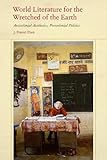World Literature for the Wretched of the Earth : Anticolonial Aesthetics, Postcolonial Politics / J. Daniel Elam.
Material type: TextPublisher: New York, NY : Fordham University Press, [2020]Copyright date: ©2020Description: 1 online resource (208 p.)Content type:
TextPublisher: New York, NY : Fordham University Press, [2020]Copyright date: ©2020Description: 1 online resource (208 p.)Content type: - 9780823289820
- Anti-imperialist movements
- Comparative literature -- Political aspects
- Postcolonialism
- Asian Studies
- Literary Studies
- Postcolonial Studies
- LITERARY CRITICISM / Semiotics & Theory
- B.R. Ambedkar
- Bhagat Singh
- Erich Auerbach
- Frantz Fanon
- Lala Har Dayal
- M.K. Gandhi
- South Asia
- anticolonialism
- comparative literature
- critique
- philology
- postcolonial theory
- online - DeGruyter
| Item type | Current library | Call number | URL | Status | Notes | Barcode | |
|---|---|---|---|---|---|---|---|
 eBook
eBook
|
Biblioteca "Angelicum" Pont. Univ. S.Tommaso d'Aquino Nuvola online | online - DeGruyter (Browse shelf(Opens below)) | Online access | Not for loan (Accesso limitato) | Accesso per gli utenti autorizzati / Access for authorized users | (dgr)9780823289820 |
Browsing Biblioteca "Angelicum" Pont. Univ. S.Tommaso d'Aquino shelves, Shelving location: Nuvola online Close shelf browser (Hides shelf browser)

|

|

|

|

|

|

|
||
| online - DeGruyter Passing Orders : Demonology and Sovereignty in American Spiritual Warfare / | online - DeGruyter Channeling Moroccanness : Language and the Media of Sociality / | online - DeGruyter Arvo Pärt : Sounding the Sacred / | online - DeGruyter World Literature for the Wretched of the Earth : Anticolonial Aesthetics, Postcolonial Politics / | online - DeGruyter Infrapolitical Passages : Global Turmoil, Narco-Accumulation, and the Post-Sovereign State / | online - DeGruyter Scatter 2 : Politics in Deconstruction / | online - DeGruyter Just Universities : Catholic Social Teaching Confronts Corporatized Higher Education / |
Frontmatter -- Contents -- Preface -- Introduction: Impossible Subjects -- 1 Lala Har Dayal’s Imagination -- 2 B. R. Ambedkar’s Sciences -- 3 M. K. Gandhi’s Lost Debates -- 4 Bhagat Singh’s Jail Notebook -- Epilogue: Stopping and Leaving -- Acknowledgments -- Notes -- Bibliography -- Index
restricted access online access with authorization star
http://purl.org/coar/access_right/c_16ec
World Literature for the Wretched of the Earth recovers a genealogy of anticolonial thought that advocated collective inexpertise, unknowing, and unrecognizability. Early-twentieth-century anticolonial thinkers endeavored to imagine a world emancipated from colonial rule, but it was a world they knew they would likely not live to see. Written in exile, in abjection, or in the face of death, anticolonial thought could not afford to base its politics on the hope of eventual success, mastery, or national sovereignty. J. Daniel Elam shows how anticolonial thinkers theorized inconsequential practices of egalitarianism in the service of an impossibility: a world without colonialism. Framed by a suggestive reading of the surprising affinities between Frantz Fanon’s political writings and Erich Auerbach’s philological project, World Literature for the Wretched of the Earth foregrounds anticolonial theories of reading and critique in the writing of Lala Har Dayal, B. R. Ambedkar, M. K. Gandhi, and Bhagat Singh. These anticolonial activists theorized reading not as a way to cultivate mastery and expertise but as a way, rather, to disavow mastery altogether. To become or remain an inexpert reader, divesting oneself of authorial claims, was to fundamentally challenge the logic of the British Empire and European fascism, which prized self-mastery, authority, and national sovereignty. Bringing together the histories of comparative literature and anticolonial thought, Elam demonstrates how these early-twentieth-century theories of reading force us to reconsider the commitments of humanistic critique and egalitarian politics in the still-colonial present.
Mode of access: Internet via World Wide Web.
In English.
Description based on online resource; title from PDF title page (publisher's Web site, viewed 25. Jun 2024)


